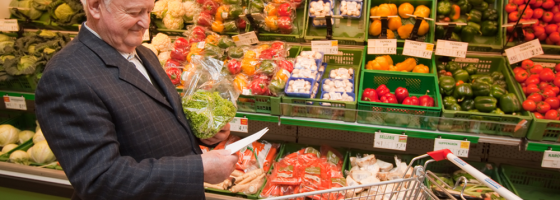Blog post
BLOG - 'New' elderly decide for themselves what they eat
World Population Day is 11 July. World Population Day developed out of efforts in 1987 to draw attention to the overpopulation of the Earth. Since 11 July 1987 the Earth's population has increased by more than 2.2 billion people. This trend is continuing unabated and will likely reach a projected peak of 9 billion people in 2050. The average age of the global population is also rapidly decreasing. At present 80 million people are born each year.

The Netherlands: double ageing
In the Netherlands, the situation is different: The population is ageing, and it is increasing only very slowly. It is expected that the Dutch population will show weak growth in the coming decades, and after 2040 it will barely increase at all. The year 2040 will see another milestone: the number of Dutch people aged 65-80 and the number of people aged 80 and up will reach their peak in the demographic landscape. Population ageing is increasing rapidly - at present there are 2.8 million senior citizens in the Netherlands (16% of the total population), whereas in 2040 there will be 4.7 million Dutch people aged 65 and up (26.5% of the population). There is also a sort of 'double ageing' phenomenon taking place, because the proportion of people aged 80 and up within the population aged 65 and up is increasing. At present, this group accounts for 25% of seniors, around 2040 it will account for more than one third, and it is expected that this group will account for more than 40% of seniors by 2060. Literally, the elderly are the future.
Living in their own home
Population ageing means that the proportion of retired people to people in the 'productive age group' of 20-64 years will change. Currently, there are nearly four potential working people for each person aged 65 and up; this will drop to two to one within a quarter of a century. This means that the so-called 'grey pressure' will nearly double. Another trend is that the proportion of people of Surinamese, Turkish and Moroccan descent aged 65 and up will increase in relation to the overall population in this age group (from less than 5% now to more than 20% in less than half a century). A characteristic of the current population aged 65 and up is that nearly all of them live independently: 95% of people aged 65 and up live in their homes. Of those aged 80 and up, in 2012 only 14% of them lived in an old people's or nursing home, and the remaining 86% lived in their own home. In light of the Dutch government's policy, this already large percentage will more likely increase than decrease.
More sophisticated, financially stronger, in better health and more outspoken
The ageing trend will have consequences for the domain of 'the elderly and food'. The elderly of the future will be increasingly expected to care for themselves in their own homes. At the same time, the elderly population will become more diverse as the number of people belonging to non-Western ethnic minorities increases. In addition, the elderly will consist of a great many baby boomers who will be more sophisticated, financially stronger, in better health and more outspoken compared to the elderly of today. Although research into the elderly within the social sciences at Wageningen UR is still limited, there is definite added value for social researchers in including aspects related to the elderly population in their research. This kind of research would build on existing Wageningen research into the elderly and food, in which a great deal of focus is given to the development of food products and meal concepts, including enriched foods and meals, for the elderly. Social scientists could examine the ambiance and social significance of meals or the impact of the eating habits of ethnic minorities on the food wishes and habits of the elderly of the future.
A vital and delicious future
Added value can also be found in how the food styles of the elderly are developing into more progressive and participatory forms of eating. Current research often creates a conservative and passive image of the elderly in relation to their food: They prefer to eat what they know and they eat what they are served. This will change in the future. In the Netherlands, it is not to be expected that the 'new' elderly will sit meekly and silently in their chairs, waiting to eat whatever is served on their plate. They will want to have a say in deciding what is good for them. They will take matters into their own hands by participating in food cooperatives and food communities. The foods that are currently trendy and cutting-edge will soon be everyday and standard. Research anticipating the future will examine elderly people who want to create and design their own food communities, including their own vegetable gardens, dieticians, doctors and culinary experts; special 'eat & meet' events; and networks (often online) for the elderly relating to food production and preparation and common meals. In the near future, the current Shareyourmeal (and its Dutch equivalent, Thuisafgehaald) and RestoVanHarte platforms may well be seen as pioneers of these trends. Not only are the elderly the future, but their future will be vital and delicious.